Ambien
Come with me on adventure you'll never remember.
Oh my God, this drug. What can I say about Ambien? I don't remember. And that's the point. The only useful thing Ambien did was spawn some of the funniest memes on the Internet. Also, adolescents are getting very, very high.1
the drug's users sometimes sleepwalk into their kitchens, claw through their refrigerators like animals and consume calories ranging into the thousands.
Zolpidem is the generic name for Ambien. It has an FDA label for short-term insomnia. The actual text of what the drug maker went back and forth with the FDA on is highly instructive; …the FDA begins…. “You prefer an indication and use section that does not include a…(next, a screenshot for vibe…)
The initial approval trials for zolpidem for insomnia demonstrated that a brief course of the medication increased the amount of sleep by 44 minutes. Ambien was the foisted upon the world. It was quite the regulatory dance:
Searle's Ambien (zolpidem tartrate) will test the depth of the market niche for a new, non-benzodiazepine sedative/hypnotic, beginning early in 1993. FDA approved the company's NDA (19-908) on Dec. 16 after a 47-month review and a busy autumn of back-and-forth negotiations.
Forty-seven months of back and forth. What could they have been debating?
Subsequent research concluded:
A meta-analysis of a randomized placebo-controlled trial was used to evaluate the effectiveness and safety of Zolpidem in the treatment of insomnia disorder for one month.
In my life, I have never met anyone who said:
“I’d like to sleep better for up to one month. After that time frame, I’m thrilled to discontinue whatever was helping, given a paucity of data to support its safety and efficacy.”
I am a psychiatrist. I have heard almost everything. This “short term insomnia only” language however, is insane beyond anything I have heard in any psychiatric hospital, therapy setting, emergency department, or panicked phone call.
Short-term insomnia isn’t a problem people ardently seek medical attention to address. And suppose you see your doctor after a few nights of insomnia only. In that case, I can say, with some confidence, that is another problem—and I am looking at you, cortico-striato-thalimo-cortical brain circuitry, and reassurance seeking as a compulsion.
Pointlessly Reassuring Research Supports Ambien’s Safety in People With Simple Problems
A Subsequent RCT looked at the longer-term use of zolpidem and assured us that randomization was successful (in Table 1—Owen’s favorite table, as my readership is well aware):
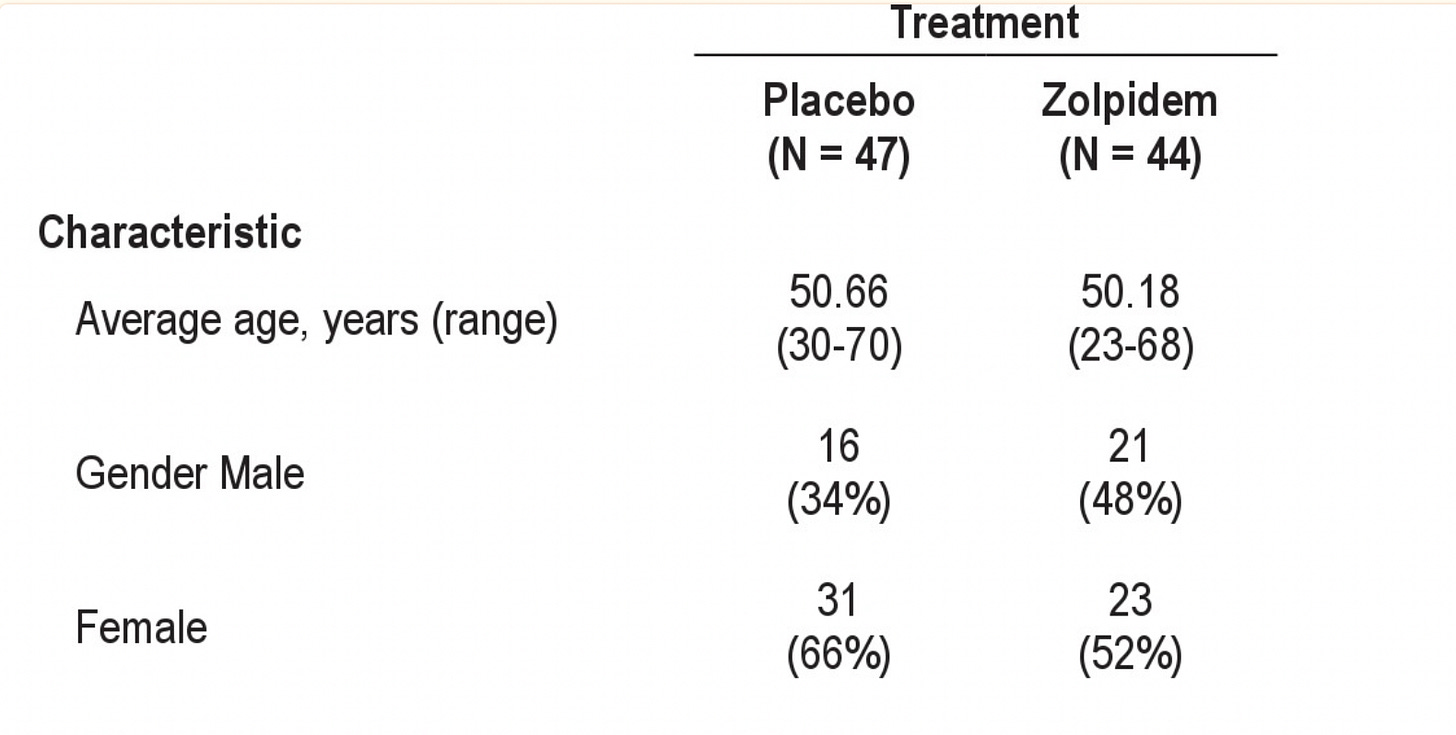
They got a sample of people with chronic insomnia—but no other problems—who were willing to be randomized to placebo or zolpidem, and be measured with pre-post polysomnography and self-report over eight months.
This is what polysomnography looks like:
Subjects had to agree to be screened before enrollment, and this was done for two nights in month one and two months in month 8 of the study. No one had a psychiatric disorder or any other significant medical condition in the study2.
Quick—find your friends who have 11 years of chronic insomnia. Now, subject them to a research-grade assessment to ensure none have any other psychiatric problems. Or save time and ask, “how is your mental health?” and exclude all enthusiastically well individuals from further consideration. Next, offer them eight months of randomized treatment with a medicine that might help them sleep, but only by 40 additional minutes. Also, they have to agree to not drink alcohol for 4 hours before bed for eight months. Now tell them it is for science. Tell me how many “yes” replies you get to that amazing offer.3
The base rate of psychiatric illness is 25% in any given year. In individuals with chronic insomnia, it’s 40%.4. Let’s return to this study; 370 were screened. They ruled out an almost perfect 39% for psychiatric illness, 17% for medical illness, 18% for sleep apnea on screening Polysomnography, and 26% for bailing on bonkers study design—sorry, “other reasons.” 125 people said yes to eight months of study. This excludes 100% of the people in whom, as a psychiatrist, I would be interested. I mean, what could go wrong?
By design, this study excludes anyone I’d ever prescribe anything. This sample feels full of lies. These lies are either on the part of the subjects or the investigators..and maybe not big capital L lies. It might simply be a careful study that misses the point entirely—these individuals don’t require the most detailed further study. Others do.
This is an implausibly perfectly enrolled study in implausibly untroubled individuals. All that having been said—This is a NIDA-funded trial. It is not industry-funded. The authors did it with R01 Research funding from NIH. It could be completely valid in the cohort of people who magically have only chronic insomnia and want to spend eight months in an RCT with no other problems.
What is the problem? Ambien is so safe!
The axe to grind here? These are not the right questions. This study is reassuring about how safe this medicine is for some remarkably resilient people who didn’t have co-occurring depression with 11 years of chronic insomnia. The same group is so agreeable as to consent to participate in that trial, blithely. It doesn’t address the vulnerable individuals, those for whom insomnia is a risk factor for completed suicide, who will be treated with this safe-in-others medicine.
What about those other imperfect insomnia patients? You know, like this author. Yep. I had Ambien prescribed in my 20s—it wasn’t for just one month. With my bipolar disorder, I would have been excluded from the NIH-funded study. You might have been excluded, just by virtue of reading this psychiatrist’s newsletter, too.
What happens in the real world with Ambien?
Tolerance develops rapidly to the sleep-inducing effects of zolpidem. You don't get more sleep after you've taken it for a while. I know studies of perfect samples say otherwise.
People like me, however, do forget that they were staying awake at night because tolerance does not develop for the amnestic effects.
This is the perfect drug. Tolerance develops rapidly to its “primary effect,” which is to help you sleep. But! One still will forget that you were staying up all night. The side effect of withdrawal? Rebound insomnia, of course.
Ambien is not a good drug for insomnia. There is close to no reason to prescribe this specific drug. It is safer than benzodiazepines— in that withdrawal seizures are not part of its withdrawal phenomenon—those have to do with the other subunit of the benzodiazepine receptor. Since that subunit is selectively omitted from zolpidem’s binding profile, this is just a drug you can never stop taking. On top of that, it's a cautionary tale in who you include, when it comes to gender, in your research studies.
It turns out that women5 metabolize the drug more slowly. Ambien sticking around in your system in the morning makes you more likely to be sleepy when driving your car, have a crash, and die6. The FDA had to issue a warning about it. There weren't enough women in the studies, and they weren't casually driving around afterward to figure this out. Ambien offered the world more deaths in automobile accidents, on top of more awkward phone calls you don't remember making.
This doctor’s guidance for prescribing Ambien?
Don't bother starting it. Consider tapering it. It's like a cautionary tale— writ small…in chronic insomnia in isolation.
It did other things, too, unfortunately, in vulnerable people who were excluded from perfect clinical samples. It increases the chance of suicide attempt and death by completed suicide7:
A significantly increased risk of suicide or suicide attempt was found in zolpidem users compared to non-users, with a pooled relative risk of 1.88 (95% CI: 1.54 – 2.30). Furthermore, an increased risk of suicidal death was observed in zolpidem users compared to non-users, with a pooled relative risk of 1.82 (95% CI: 1.43 – 2.30).
And the increased risk in a sample of 344,753 participants, of which 42,279 were zolpidem users, was—of course— dose-dependent.
Even if you don't kill yourself, major injury is also increased on a population basis:
The long-term use of zolpidem is associated with a significantly greater risk of head injury or fracture requiring hospitalization than in patients who do not use sedative-hypnotic agents (P<.001), particularly in the younger (aged 18-54 years) patients.
This result is also of a large magnitude; in both the younger cohort (aged 18-54 years) was 1.70 (95% CI, 1.15-2.51), and in the older cohort (aged ≥55 years) was 1.57 (95% CI, 0.78-3.13).8. In fairness, the journal in which that was published, Mayo Clinic Proceedings is a total rag. The authors probably were on the take from big “Not Head Injury Requiring Hospitalization.”
To put that in context, it’s more risky that chewing tobacco on your risk of adenocarcinoma, for men.
I will also mention, briefly, the fiscal tomfoolery of Ambien CR, the brilliant patent extender strategy to make sure you beat generics to market9:
With the Hatch-Waxman Act of 1984, the FDA included an unchallengeable exclusivity period for newly approved drugs, independent of patents. This …generates an incentive…to strategically delay the introduction of… (reformulations) of drugs until just before patent expiration…. This way, the reformulated drug competes mainly with newly introduced generics of the original drug. If …introduced well before the original drug’s patent expires, the reformulated drug would compete only with the original drug.
Brilliant. Have you heard of Ambien CR (Controlled Release)?
I give it zero stars. Has anyone seen my Tostitos, by the way?
The next morning, the night eaters remember nothing about their foraging. But they wake up to find telltale clues: mouthfuls of peanut butter, Tostitos in their beds, kitchen counters overflowing with flour, missing food, and even lighted ovens and stoves. Some are so embarrassed they delay telling anyone, even as they gain weight.
Thank you for reading. Other installments include Prozac, Xanax, Klonopin, Lurasidone, Olanzapine, Zulranolone, Benzos, Caffeine, Semeglutide, Lamotrigine, Cocaine, Xylazine, Lithium, dextromethorphan/bupropion and Adderall, etc.
Jason A. Ford, James McCutcheon, The misuse of Ambien among adolescents: Prevalence and correlates in a national sample, Addictive Behaviors, Volume 37, Issue 12, 2012, Pages 1389-1394, ISSN 0306-4603, https://doi.org/10.1016/j.addbeh.2012.06.015.
Eligibility requirements included good general physical and mental health as determined by physical examination, urinalysis and blood chemistry profiles. Those with acute or unstable illnesses, or illnesses with a potential to affect sleep, and conditions which could affect the pharmacokinetics of zolpidem, were excluded. Subjects using central nervous system acting medications were also excluded. The Structured Clinical Interview for the DSM (SCID) and the Hamilton Rating Scale for Depression were used to exclude those with psychiatric disorders and/or drug and alcohol dependence.
As a practicing physician, I don’t care what that study demonstrates because even if the results in the sample are 100% valid, they are the least generalizable sample of humans I’ve heard described. I call it utter and total bullsh*t…
Khurshid KA. Comorbid Insomnia and Psychiatric Disorders: An Update. Innov Clin Neurosci. 2018 Apr 1;15(3-4):28-32. PMID: 29707424; PMCID: PMC5906087.
Zhao, H., DiMarco, M., Ichikawa, K., Boulicault, M., Perret, M., Jillson, K., ... & Richardson, S. S. (2023). Making a ‘sex-difference fact’: Ambien dosing at the interface of policy, regulation, women’s health, and biology. Social Studies of Science, 03063127231168371.
James E. Meeker, Constance W. Som, Edward C. Macapagal, Peter A. Benson, Zolpidem Tissue Concentrations in a Multiple Drug Related Death Involving Ambien®, Journal of Analytical Toxicology, Volume 19, Issue 6, October 1995, Pages 531–534, https://doi.org/10.1093/jat/19.6.531
Hiba Khan, Aakriti Garg, Yasmeen, Nidhi B. Agarwal, Deepak Kumar Yadav, Mohd. Ashif Khan, Salman Hussain, Zolpidem use and risk of suicide: A systematic review and meta-analysis, Psychiatry Research, Volume 316, 2022, 114777, ISSN 0165-1781, https://doi.org/10.1016/j.psychres.2022.114777.
Ming-May Lai, Cheng-Chieh Lin, Che-Chen Lin, Chiu-Shong Liu, Tsai-Chung Li, Chia-Hung Kao,
Long-Term Use of Zolpidem Increases the Risk of Major Injury: A Population-Based Cohort Study, Mayo Clinic Proceedings, Volume 89, Issue 5, 2014, Pages 589-594, ISSN 0025-6196, https://doi.org/10.1016/j.mayocp.2014.01.021.
Shapiro, B.T. Estimating the cost of strategic entry delay in pharmaceuticals: The case of Ambien CR. Quant Mark Econ 14, 201–231 (2016). https://doi.org/10.1007/s11129-016-9170-9




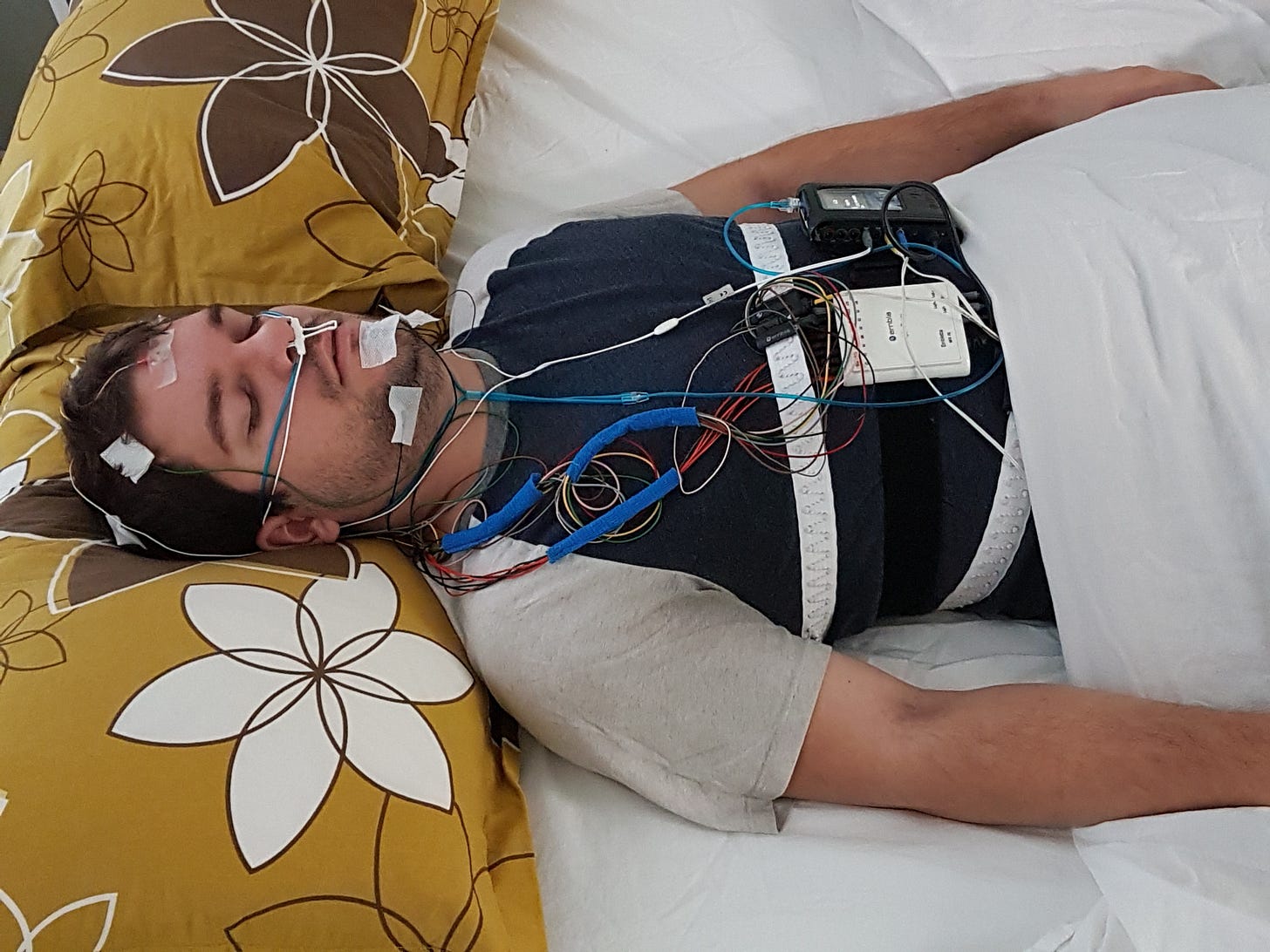

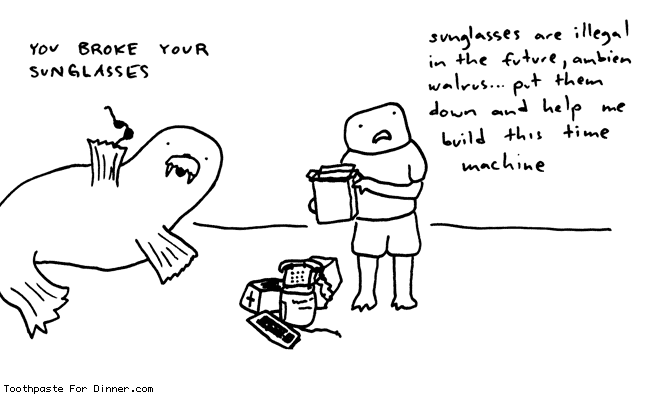
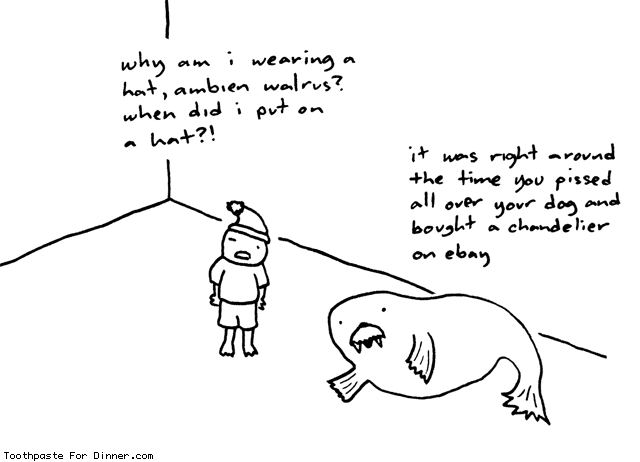
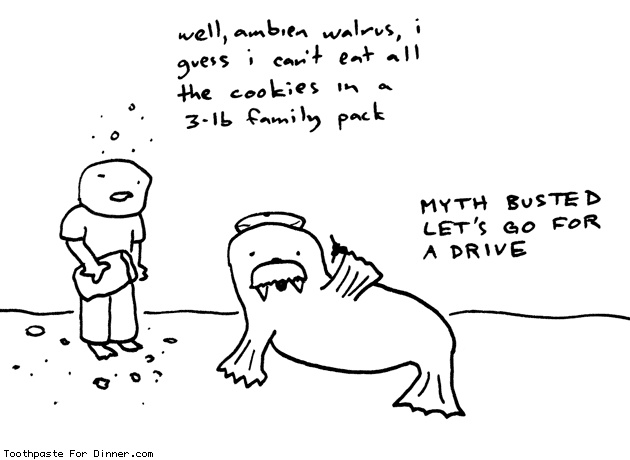
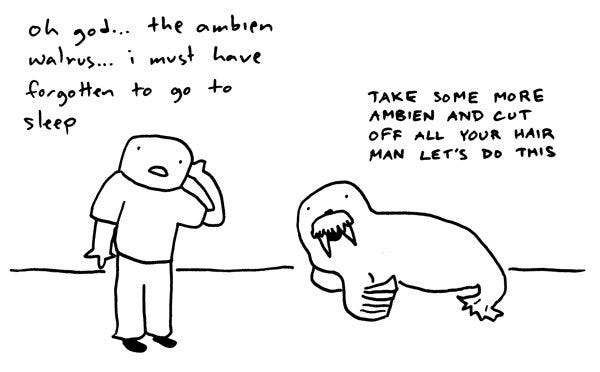
And this analysis of oversight and the possible life ruining disasters that ensued is truly fascinating and somewhat terrifying as well. Forgot to mention that.
So ambien is not prescribed anymore? You are talking about it in the past tense.
The problem with looking at mental illness apart from insomnia is you cannot tell if you are going extra crazy from not sleeping or if you don't sleep because you are going crazy. Of course people with severe insomnia are likely to
have mental illness but the things that crop up
when you get severe insomnia can be way outside the normal range of your standing illness.
Perhaps this is your point.
One becomes quite desperate if one never sleeps. Oh, the stories I could tell. But it's horrible to even remember.
Ambien seemed an essential thing for me during the period I took it. I was surprised to discover much later you can get high from it. I still don't know how. If it didn't work to help me sleep, then it would not feel like anything much. I would just stay awake.
I wasn't crazy about it because it made me extremely spacey the next day, even worse than not sleeping. However, it did help me sleep more than I was usually able to without it.
Because I seem to have solved this problem (though I still don't sleep normally, I don't go days and days unable to sleep) I don't know what is done for people with this affliction these days.
I hope to God there's something else for them.